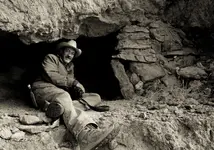Cactusjumper wrote
and
IPUK wrote
Interesting posts, have to agree with much, and respectfully disagree in PART.
There is strong evidence that the famous Apaches of the southwest, were really driven from the southern plains (Texas, NM) by none other than the equally famous Comanches during the 1600s, in large part due to the slave trade, as well as the other profits of a raiding, mounted culture that the Comanches had become earlier than most of the other plains tribes. The foot-bound Apaches were relatively easy targets for the mounted Comanches for over a century, driving many Apaches to the less hospitable desert southwest. Some Apaches of the plains also adopted the horse culture and proceeded to become every bit the terror that the Comanches were, and were able to 'hold their own' but a large part of their people had already moved SW. A good book that well explains the mass movement of Apaches from the plains to the desert is The Other Slavery, the uncovered story of Indian Enslavement in America by Andres Resendez.
Before someone now proceeds to blame the Spanish for buying slaves and other booty from the Comanches and thus fueling the horrific trade, I would point out that when this business started, a large party of Comanches came into New Mexico with a number of captives, mostly Apaches, to sell. When the horrified Spanish refused to buy these slaves, the Comanches proceeded to cut off the heads of their captives in front of the Spanish, which of course resulted in the Spanish agreeing to buy the slaves. Voila, a slave trade is born!
As to the fighting abilities of the Apaches, as none of us were alive when these events were happening, we are limited to viewing it through the written accounts of those that had to face them. These accounts and reports are of course biased, there is bravado, bragging, attempts to belittle the enemy, and alternatively painting the Apaches as invincible enemies, the devil incarnate. Based on the outcomes of numerous and mostly small battles, the Apaches won and lost many fights. But yet were these real victories, and real defeats? A survivor of an Apache raid that seemed to drive off the warriors, might view the outcome as a defeat of the Apaches, yet the Apaches might have already accomplished their goals and simply retreated by choice rather than suffer un-necessary casualties. By the time of the American-Apache wars, the Apache numbers had fallen precipitously, but a century earlier their numbers were quite on a par with other major tribes such as the Navajos. We have from Spanish sources several estimates of Apache numbers which may of course be far off the mark, but are logical when one takes into consideration the continual attrition loss of never-ending warfare. Most witness accounts of encounters with Apaches (battles) credited them with being very brave, able to appear to be more numerous than reality, and to engage and disengage from battle at will. Being inferior in numbers, with a very low rate of replacements for losses in battles, this strategy is both logical and best available to them.
Today the Apaches like most of the major tribes that fought against the American 'conquest' have been glorified, romanticized and
greatly distorted by books and especially by Hollywood. They are painted as the noble red men, defending family and home
which is partly true, and ignoring or minimising their actual record as rather vicious enemies, brutal almost beyond belief, capable of being deceitful, treacherous, capturing and enslaving enemies, committing butchery and savagery beyond most other tribes. We have eyewitness records of 'white' women that had their infant children literally torn from their arms and immediately beating the brains out of the child in front of the mothers.
This is not to say that the Americans, Mexicans and Spanish did not also practice savagery and butchery against the Apaches (and any other tribe that might appear to be Apaches like the Yavapais) but unfortunately most people today have a very unrealistic idea of the Indians and that period of history. Even when not at war (which was almost never) life for the Apaches, and all other tribes for that matter, was precarious and difficult. Starvation was always lurking just around the corner, suffering through winters and the very real possibility of sudden assault by enemies made for a life that most today would find unbearable. One of the rather surprising facts of life for "wild" tribes were suicides, quite common among many tribes and especially by women, whose lot in this culture was far from admirable. It is a testament to the courage and fortitude of all Indian tribes that they were able to endure and survive, especially when you remember that some tribes were literally exterminated.
Many people in the American southwest and northern Mexico wanted the Apaches to be exterminated as well.
Sorry for getting carried away there, but for anyone that may think the Apaches were not so great as fighters, I would suggest to read the accounts of the participants of the battle of Apache Pass (1862), which was a two-day standup fight, and is hardly the only such example, another would be their mass assault on Tucson, 1776 if memory serves, allied with the Navajos for that one. Many underestimated the Apaches and learned the hard way.
Last point in this very long winded post but
there are good reasons why the Apaches surrendered, as with all the other Amerindian tribes. Their lives were not SO wonderful, and the deal they obtained from the US government
providing them with a steady and reliable source of food, was a powerful incentive, coupled with an end to the never ending warfare in which they were usually the hunted. Let us not romanticize them, nor minimize their place in history.
Please do continue;












